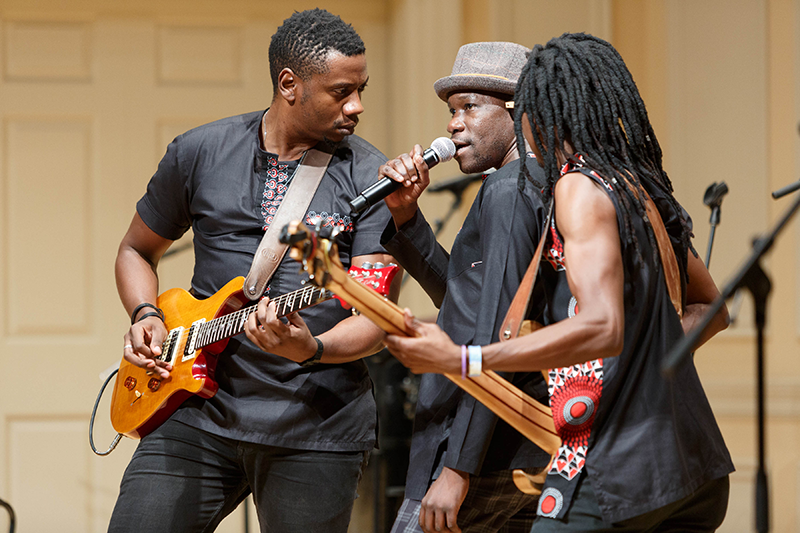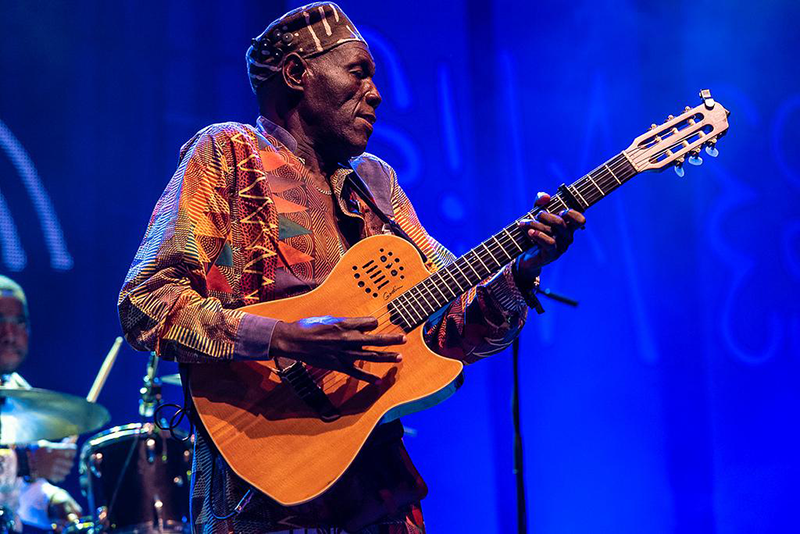- Entertainment
- No Comment
Mokoomba select most essential Zimbabwean albums; see who is on the list

By Tom Taylor@tomtaylorfo I faroutmagazine.co.uk
Mokoomba’s music is as daring and dazzling as wearing a shell suit on a bonfire night. Their music is so damn danceable by virtue of the influences the classic Zimbabwean band swirl into it.
They take the rhythmic beats of the Luvale people, mix soukous guitars from the Congo, carelessly dash in the almost punk-adjacent frontman Mathias Muzaza, and even season it with a horn section from the Ghanaian highlife realm.
The result is something singularly expansive that encapsulates the pan-African movement currently unfurling amid regional folk music.
Hailing from Victoria Falls, the six-piece group formed back in 2002. Immediately, they began to tackle the social ills of their country and lament the HIV epidemic in a manner that eviscerated any misery and brought exultancy to hardship.
This has not only made them arguably the defining Zimbabwean band of the 21st century but also a symbol of their country’s unfurling musical story.
To celebrate that, ahead of their London dates this August, we caught up with the group, and they told us about the most essential albums in Zimbabwean history.
Their selections offer a timeline of how magnificent music developed amid a whirlwind of different circumstances, and we’ve tied it all up in a playlist perfect for your summer delectation.
Mokoomba select essential Zimbabwean:
An introduction to Zimbabwean music:
“Over the years, music in Zimbabwe has gone through many changes,” the band explain.
“A lot of the changes have directly inspired by major political, economic and social developments throughout our country’s history. In pre-colonial Zimbabwe, music was a very important part of society, used in everyday life and importantly for traditional and spiritual rites and rituals.”
They add: “There were many types of peoples, music and instruments in our region, and the instrument that became dominant is called the Mbira, and music from the mbira has endured to inspire the development of music in Zimbabwe and beyond up to this day.”
Traditionalist 11th-century folk music:
- Tozvireva Tingaputike Neshungu by Mbira dzeNharira
“This album captures the best of traditional Mbira music with a mix of old songs and rhythms from the 11th century, the era of the Munhumutapa dynasty which built the impressive great Zimbabwe monument, as well as some of the group’s contemporary compositions,” Mokoomba state.
“This group Mbira dzeNharira has really done a great job in the preservation and promotion of this traditional/spiritual music and our band is inspired to do the same in our own way.”
Colonial-era second-wave folk music:
- Lion songs: Essential tracks in the making of Zimbabwe by Thomas Mapfumo
- Tuku Music by Oliver Mtukudzi
“The area that is now Zimbabwe was colonised by the British and named Rhodesia, and there was an attempt by the colonial administration together with the church to suppress traditional forms of expression,” the band informed me.

“The new music that developed during that time spoke to the forced adaptation to life in the new townships and cities, to labour migrations, and later to protest and the struggle for independence, also known as the Chimurenga. Artists like Thomas Mapfumo and Oliver Mtukudzi represent this transformation with very long careers that span over five decades.”
They continue: “The wave of independence of many African states, starting with Ghana in 1957, generated a huge wave of music by bands and musicians, who became huge household names and appealed across the continent.
“That music found its way to our country and inspired some local acts to look to more towards Africa than the West for musical ideas. Our parents also started listening to and collecting local and African music, and it’s from their collection that we got introduced to a more broad local and pan-African playlist.”
Modern Zimbabwean pan-African masterpieces:
- Passage of Time by Andy Brown
- Ancient Voices by Chiwoniso Maraire
“Independence in 1980 brought a new optimism and new opportunities and also a new reorganised society,” the band explain. “This era saw an explosion of creativity and an embrace of once shunned traditional music. The music became more experimental and bands more integrated. Andy Brown and Chiwoniso Maraire and children of the generation.”

They add: “As the euphoria of independence wore off and society once again had to confront the ensuing economic and political challenges, music again responded; sounding warning, giving advice, giving a voice to those without.”
Concluding: “The albums that we selected capture the development of music in Zimbabwe in the most deep and meaningful way. Each artist is a legend in their own right and the story of Zimbabwe is not complete without these albums.
“They have been the soundtrack of our joy and pain, triumphs and failures and as a band we feel the weight of responsibility to make music that speaks to the issues that affect and impact our society today and also to be able to preserve and promote the music and stories that have come before us so we can build on this rich heritage that we have and a lucky everyday to be inspired and healed by.”
